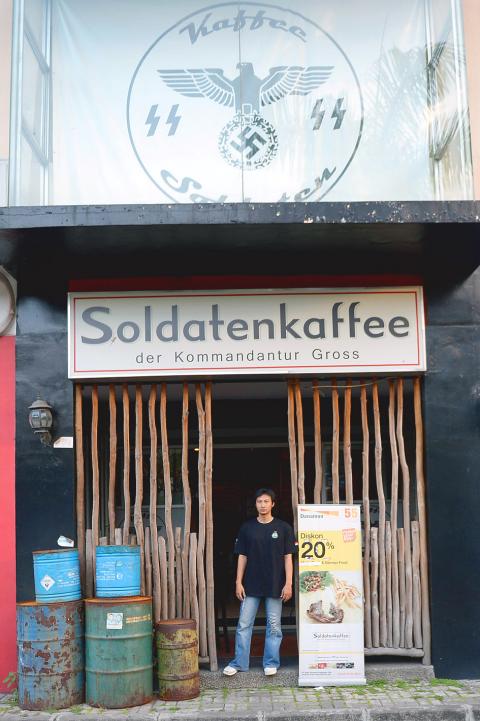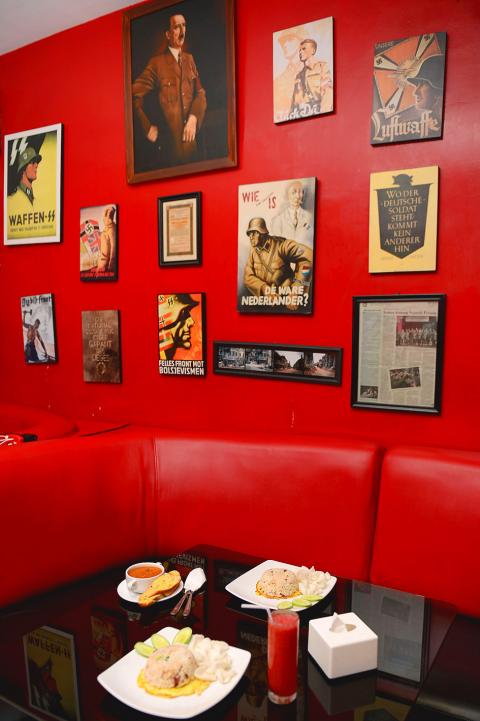From a painting hung high on a blood-red wall, Adolf Hitler peers down on young students eating schnitzel and slurping German beer in the Soldatenkaffee (“The Soldiers’ Cafe”), Indonesia’s Nazi-themed cafe.
The coffeeshop opened its doors in the western Javanese city of Bandung in 2011, named after the popular hangout for soldiers in Germany and occupied Paris during World War II.
Eerier than the gas mask canisters and battle flags bearing swastikas is the more than two years’ silence that has followed the cafe’s grand launch.

Photo: AFP
When the cafe opened no one voiced offense at the waiters and guests dressed as Nazi soldiers — the Holocaust is weak on the radar in Indonesia, home to the world’s biggest Muslim population, where the Jewish community numbers a mere 20 people.
Yet a recent report about the Soldatenkaffee in the English-language Jakarta Globe newspaper triggered angry responses online and prompted Bandung Deputy Mayor Ayi Vivananda to summon the owner for a meeting.
“We need to ask him first in detail what his real intentions are, but what is clear is that Bandung City will not allow anyone here inciting racial hatred,” he said on Thursday.

Photo: AFP
Henry Mulyana, the cafe’s creator and owner, said he did not intend to bring back memories of the Holocaust, but was not surprised to be branded a “bad guy.”
“I don’t idolize Hitler, I simply adore the soldiers’ paraphernalia,” Mulyana, a Christian who likes playing with air rifles, told reporters at the cafe on Tuesday.
His collection is on display for diners and includes a water canteen, bayonet, goggles and a lantern, most bought online.
“The ones with swastikas on them are worth more,” he said.
The restaurant had only ever received positive press before the recent exposure in English-language media and receives a regular stream of customers.
“We’re living in Indonesia and Indonesians weren’t tortured in the Holocaust, so we don’t really care,” mining company employee Arya Setya said as he ate spaghetti at the cafe with his girlfriend.
Yet now that news of the cafe’s existence has reached a wider audience, it has sparked outrage among Jewish communities in other parts of the world.
“The Simon Wiesenthal Center is reaching out to senior Indonesian diplomats to express on behalf of our 400,000 members and victims of the Nazi Holocaust our outrage and disgust,” Rabbi Abraham Cooper from the US based Jewish human rights group told reporters by e-mail.
Under Indonesian law, anyone who deliberately shows hatred toward others based on race or ethnicity can be jailed for up to five years.
Mulyana said that his cafe has also attracted Western guests, including Germans, with one photographed on its Facebook page wearing a red swastika T-shirt along with several Indonesians in the same clothes.
He revealed he plans to set up an even bigger cafe on the resort island of Bali, which attracts throngs of tourists each year.
“I’ll certainly display Hitler’s image, as well as Winston Churchill’s and paraphernalia from American and Japanese soldiers from World War II,” he said.
His cafe could not contrast more deeply with attitudes in Europe, where several countries have criminalized the promotion of Nazism and Holocaust denial.
While Mulyana does not deny the Holocaust happened, he said making the tragedy taboo was hypocritical.
“If we want to speak up about humanity, why don’t they stop wars in this world now, like in Afghanistan? War always claims so many lives,” he said.
However, when contacted by reporters yesterday Mulyana said he had decided to close down the cafe temporarily, refusing to give further details.
Historian Asvi Warman Adam from the Indonesian Institute of Sciences blames Indonesia’s education system for a lack of awareness about the Holocaust.
“We don’t hear a lot of criticism against the Nazis and fascism in Indonesia,” Adam said. “Hitler’s book Mein Kampf is banned in many countries, but it’s freely distributed here.”
Islamic hardliners are unlikely to make any noise about the cafe, “but if a Jewish-themed cafe opened, they would most likely stage a protest,” Adam said.

The Eurovision Song Contest has seen a surge in punter interest at the bookmakers, becoming a major betting event, experts said ahead of last night’s giant glamfest in Basel. “Eurovision has quietly become one of the biggest betting events of the year,” said Tomi Huttunen, senior manager of the Online Computer Finland (OCS) betting and casino platform. Betting sites have long been used to gauge which way voters might be leaning ahead of the world’s biggest televised live music event. However, bookmakers highlight a huge increase in engagement in recent years — and this year in particular. “We’ve already passed 2023’s total activity and

Nvidia Corp CEO Jensen Huang (黃仁勳) today announced that his company has selected "Beitou Shilin" in Taipei for its new Taiwan office, called Nvidia Constellation, putting an end to months of speculation. Industry sources have said that the tech giant has been eyeing the Beitou Shilin Science Park as the site of its new overseas headquarters, and speculated that the new headquarters would be built on two plots of land designated as "T17" and "T18," which span 3.89 hectares in the park. "I think it's time for us to reveal one of the largest products we've ever built," Huang said near the

BIG BUCKS: Chairman Wei is expected to receive NT$34.12 million on a proposed NT$5 cash dividend plan, while the National Development Fund would get NT$8.27 billion Taiwan Semiconductor Manufacturing Co (TSMC, 台積電), the world’s largest contract chipmaker, yesterday announced that its board of directors approved US$15.25 billion in capital appropriations for long-term expansion to meet growing demand. The funds are to be used for installing advanced technology and packaging capacity, expanding mature and specialty technology, and constructing fabs with facility systems, TSMC said in a statement. The board also approved a proposal to distribute a NT$5 cash dividend per share, based on first-quarter earnings per share of NT$13.94, it said. That surpasses the NT$4.50 dividend for the fourth quarter of last year. TSMC has said that while it is eager

China yesterday announced anti-dumping duties as high as 74.9 percent on imports of polyoxymethylene (POM) copolymers, a type of engineering plastic, from Taiwan, the US, the EU and Japan. The Chinese Ministry of Commerce’s findings conclude a probe launched in May last year, shortly after the US sharply increased tariffs on Chinese electric vehicles, computer chips and other imports. POM copolymers can partially replace metals such as copper and zinc, and have various applications, including in auto parts, electronics and medical equipment, the Chinese ministry has said. In January, it said initial investigations had determined that dumping was taking place, and implemented preliminary